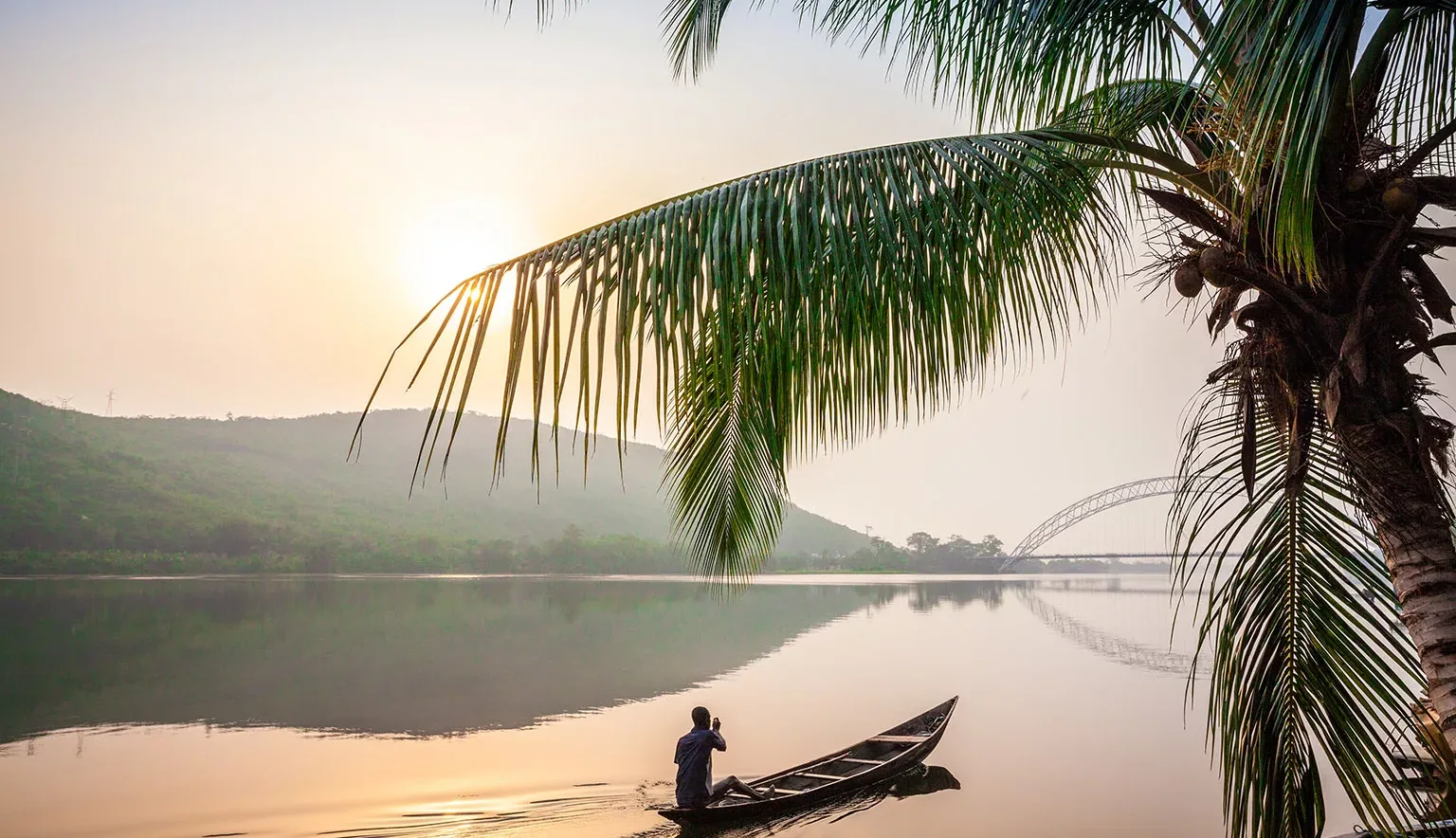Steeped in history, culture, and nature, Ghana continues to thrive as an increasingly sought-after travel destination in Africa. Supplemented by unparalleled hospitality and a range of accommodation options to suit any traveller, it presents a unique and enriching paradise not to be missed.
INTRODUCTION
Ghana, a vibrant and welcoming nation on West Africa’s Gulf of Guinea, is an increasingly popular destination for travellers seeking a blend of culture, history, and natural beauty.
The country’s diverse landscape ranges from golden beaches along the Atlantic coast to lush rainforests and rolling savannas that stretch inland – varied ecosystems that provide an ideal backdrop for an array of outdoor activities, from hiking in tropical forests to relaxing on tranquil beaches.
Ghana’s national parks and reserves are home to an impressive range of wildlife, offering bountiful opportunities for ecotourism. Mole National Park, the country’s largest wildlife refuge, is renowned for its populations of elephants, antelopes, and baboons, as well as its rich birdlife, flora, and fauna.
Meanwhile, at Kakum National Park, visitors can explore the dense rainforest via a unique canopy walkway, providing a bird’s-eye view over its network of towering natal elm and trichilia prieuriana trees.
Along the coast, sites such as the Ankasa Conservation Area and Cape Three Points are known for their protected environments and biodiversity, including rare species of monkeys and forest elephants.
Ghana also boasts well-developed tourism infrastructure, catering to both luxury and budget travellers. It offers a range of accommodations from beachfront resorts and boutique hotels to eco-lodges nestled in nature reserves, complemented by the warmth and hospitality for which Ghanaians are known, ensuring a comfortable and memorable stay.
Beyond its natural attractions, Ghana is steeped in history and culture. The country boasts UNESCO World Heritage Sites such as the Asante Traditional Buildings, which served as shrines during the times of the Ashanti Empire and still practice the Asante’s traditional religion today.
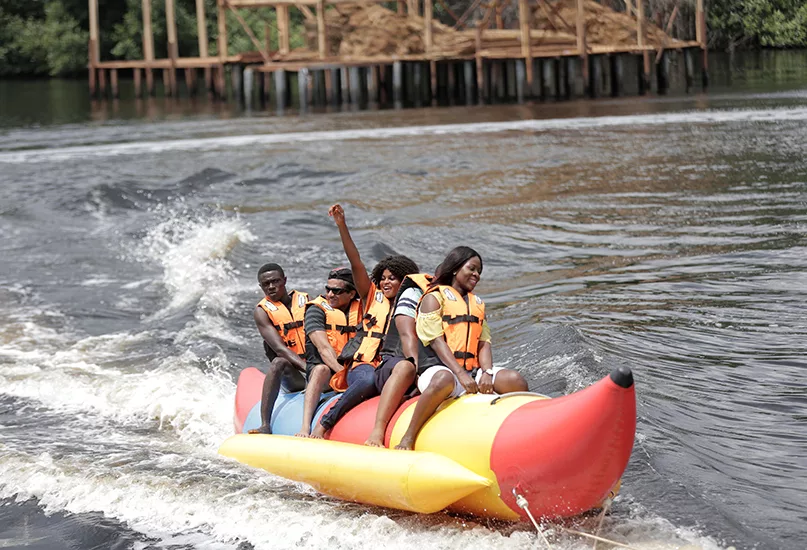
Q&A GHANA TOURISM AUTHORITY
We speak to Akwasi Agyeman, CEO of the Ghana Tourism Authority, who reflects on the country’s recent tourism influx and explains how his organisation has supported this growth whilst ensuring sustainable practices, promising a bright future for Ghanaian tourism.
Firstly, can you talk us through the origins of the Ghana Tourism Authority and its initial vision?
Akwasi Agyeman, CEO (AA): The Ghana Tourism Authority (GTA) was established as the Ghana Tourist Board over 50 years ago. It was renamed by the Parliament of Ghana in 2011 under Act 817.
GTA’s initial vision was to create a sustainable tourism industry that not only attracted visitors but also contributed to the socioeconomic development of Ghana.
This vision aimed to highlight Ghana’s rich cultural heritage, natural beauty, and warm hospitality.
What are your organisation’s current goals and responsibilities?
AA: Our primary goals include promoting Ghana as a top travel destination, enhancing visitor experiences, and ensuring sustainable tourism practices.
We carry out various activities such as targeted marketing campaigns, partnership development with local businesses, and community engagement initiatives to achieve these goals.
Notably, the ‘Beyond the Return’ initiative, launched in 2020, aims to build on the success of the ‘Year of Return’ in 2019 by encouraging the African diaspora to reconnect with their roots and invest in Ghana.
Why, in your opinion, should someone visit Ghana today?
AA: Ghana is a rich mixture of history, culture, and hospitality. It is like a buffet, offering visitors a wide array of choices to suit their preferences. Visitors today can explore our historic slave trade forts, vibrant markets, and stunning landscapes.
What defines Ghana is its people – warm, welcoming, and proud of their heritage – and our ability to offer immersive experiences that connect visitors with our culture. The ‘Year of Return’ in 2019 saw a significant increase in tourism with over 1.1 million visitors, highlighting the global African diaspora’s interest in reconnecting with their heritage.
How do you market and promote Ghana’s various travel offerings to both domestic and international tourists?
AA: We utilise a multi-channel approach to market Ghana’s travel offerings, including social media campaigns, collaboration with travel influencers, tour operators, and participation in international travel fairs.
We also work closely with local travel agencies to showcase unique experiences that appeal to both domestic and international tourists.
Our ‘December in GH’ campaign, which promotes Ghana as a prime destination for December holiday celebrations, has been particularly successful in attracting visitors during the festive season.
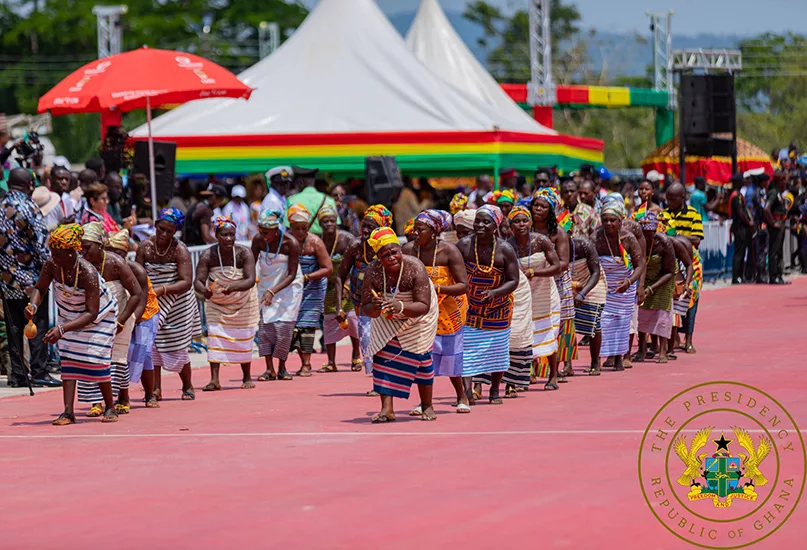
As a culturally vibrant destination with a busy events calendar, what type of traveller does Ghana typically attract?
AA: Ghana attracts a diverse range of travellers, including culture enthusiasts, adventure seekers, and those interested in history.
Our busy events calendar – featuring festivals, art exhibitions, and music shows – attracts many who appreciate cultural immersion and vibrant social experiences.
Heritage tourism in particular has seen a surge, with many from the global African diaspora visiting to explore their ancestral roots.
What does the nation offer in terms of alternative tourism models?
AA: Ghana offers opportunities in agritourism, ecotourism, and community-based tourism experiences. These initiatives allow visitors to connect with local communities and nature.
We aim to develop these areas further, with specific goals related to sustainable practices and community involvement in tourism activities.
For example, our ecotourism projects in the Kakum National Park and Mole National Park are designed to promote conservation and provide economic benefits to local communities. In the last few years, we have passed legislation which seeks to get communities and traditional authorities more involved in community-based tourism experiences.
As research is the backbone of your work, what transformational trends are you acutely aware of and how are you utilising them?
AA: By conducting thorough research and analysis, we stay informed of the latest trends, such as the rise in demand for experiential travel and wellness tourism.
We are adapting our offerings to align with these trends, implementing nature-focused packages and authentic local experiences to cater to evolving tourist preferences.
The increasing interest in heritage tourism among the African diaspora has also influenced our strategies, leading to the development of more culturally immersive experiences. The use of technology and artificial intelligence (AI) to drive marketing and customisation is also something we have been doing recently.
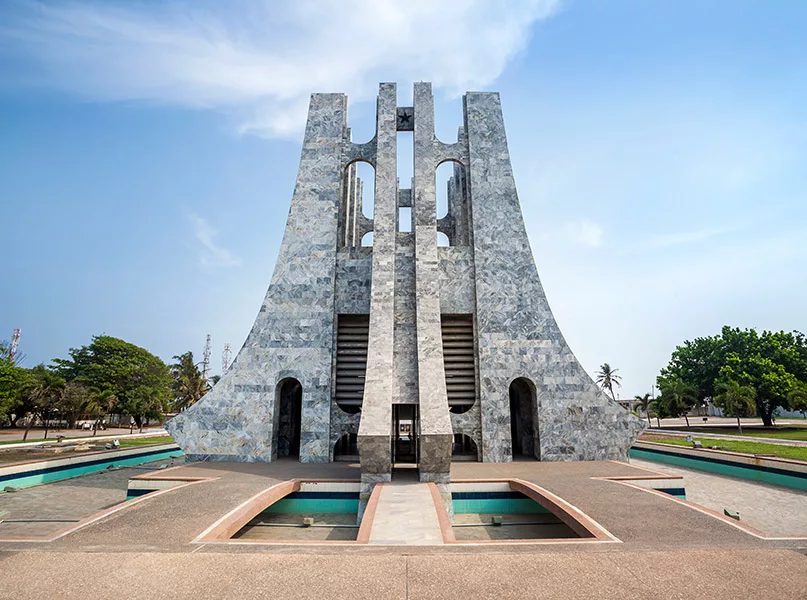
What standards, classifications, and licences do you have in place to regulate and grade tourism enterprises, facilities, and services in the country?
AA: We have established standards and classifications for tourism enterprises, which include licensing requirements for hotels, tour operators, and attractions.
This ensures quality services and safety for tourists, contributing to a positive experience in Ghana.
Our regulatory framework is designed to support sustainable tourism development and protect the interests of both tourists and local communities. A few of the regulations include:
- Registration and Licensing of Food, Beverage, and Entertainment Enterprises Regulations, 2016 (L.I. 2238) – This regulation mandates the registration and licensing of food, beverage, and entertainment enterprises to ensure they meet specific standards.
- Accommodation and Catering Enterprises Regulations, 1979 (L.I. 1205), as amended by Accommodation and Catering Enterprises (Amendment) Regulations, 2001 (L.I. 1686) – These regulations govern the standards and operations of accommodation and catering enterprises.
- Regulation of Tourist Attractions and Sites (L.I. 2393) – This regulation requires all tourist sites and attractions to be licensed by GTA. It aims to ensure the safety, maintenance, and proper management of these sites.
Finally, are you optimistic about the future of the tourism industry in Ghana?
AA: Yes, I am very optimistic about the future of the tourism industry in Ghana. With a global focus on sustainable travel and unique cultural experiences, Ghana is well-positioned to attract more visitors.
Our commitment to improving infrastructure and promoting responsible tourism will pave the way for continued growth and success in the coming years.
The success of initiatives like the ‘Year of Return’ and ‘Beyond the Return’ demonstrates the potential for heritage tourism to drive economic growth and foster cultural connections.
GHANA’S WATERFALLS IN FOCUS
Ghana’s waterfalls offer a captivating attraction for nature lovers and adventurers alike. Providing a serene escape into the heart of the country’s lush wilderness, each waterfall presents a unique spectacle.
Boti Falls, located in the Eastern region, enchants visitors with its twin cascades, often described as ‘male’ and ‘female,’ creating a mystical atmosphere that comes alive during the rainy season.
Meanwhile, Wli Waterfalls, the tallest in West Africa, beckon travellers to the Volta region with its majestic plunge from a height of 80 metres (m), cascading into a natural pool where visitors can take a refreshing dip.
The enchanting Kintampo Falls, located in the Brong-Ahafo region, offers a multi-tiered cascade surrounded by rich greenery, providing picturesque views and serene picnic spots.
Those seeking a more off-the-beaten-path experience can explore the lesser-known Fuller Falls, also in Brong-Ahafo, where the waters flow over a series of rocky steps, creating gentle rapids and pools ideal for relaxation.
Exploring Ghana’s waterfalls is a journey into nature’s artistry, where visitors can hike through pristine rainforests, listen to the soothing sounds of cascading water, and immerse themselves in the beauty and tranquillity of Ghana’s natural wonders.
OUTLOOK RECOMMENDS
Eat:
FOR A TANTILISING GASTRONOMIC JOURNEY…
White Restaurant & Garden in the heart of Accra is a culinary haven that invites guests to indulge in a gastronomic journey to tantalise the tastebuds.
The elegant establishment, known for its unparalleled setting overlooking Accra’s vibrant city skyline, provides a unique escape elevated above the hustle and bustle of the city.
Offering a diverse menu that fuses local Ghanaian flavours, herbs, and spices with international cuisine, White Restaurant & Garden caters to all palates.
Diners can enjoy fresh seafood, succulent grilled meats, and vegetarian specialities prepared with the finest ingredients and supplemented by an extensive local wine list and an array of classic and signature cocktails.
In addition, the chef’s specially selected five-course set menu promises to amaze, including a plethora of high-end culinary options to suit any palate.
White Restaurant & Garden’s attentive service and stylish décor, complete with lush green and floral garlands cascading from the ceiling, further enhance visitors’ dining experience, making it a popular choice for those looking for a restaurant with a wow factor.
An outdoor seating area, the Sunken Garden, is surrounded by lush greenery and is perfect for a leisurely lunch or romantic dinner under the stars.
The restaurant also hosts special events such as live music nights and themed dinners from sophisticated jazz music to contemporary house DJs, providing a lively yet classy atmosphere that every guest can enjoy.
It’s a place where fine dining meets natural beauty, offering a culinary escape that is both unique and unforgettable.

Sleep:
FOR A RELAXING ESCAPE…
Nestled on the picturesque banks of the Volta River in Akosombo, The Peninsula Resort offers an exquisite escape into luxury and tranquillity.
The stunning grounds, set against the backdrop of dramatic hills and serene waters, provide an ideal retreat for those seeking both relaxation and adventure.
The resort itself features elegantly appointed rooms and suites, each designed to offer comfort and style, with private balconies that offer breathtaking views of the river and surrounding landscapes.
At The Peninsula Resort, guests can indulge in a variety of leisure activities, ranging from lounging by the generous infinity pool to exploring the pristine river on a boat cruise.
Golf enthusiasts will enjoy the meticulously designed nine-hole golf course, set amidst verdant greenery and offering a challenging yet rewarding experience.

Meanwhile, the resort’s spa offers a sanctuary of relaxation where rejuvenating treatments and therapies await, perfect for unwinding after a day of adventure.
Dining at The Peninsula Resort is a delight, with multiple options featuring a diverse menu of both local Ghanaian delicacies and international cuisine prepared with fresh regional ingredients.
For those seeking a blend of luxury, adventure, and natural beauty, The Peninsula Resort provides an unparalleled experience in Ghana, combining world-class amenities with the enchanting charm of Akosombo’s landscapes.
So, whether you seek a romantic getaway, a family vacation, or a business retreat, The Peninsula Resort promises an unforgettable stay, where every detail is designed to create lasting memories.

LANDMARK ATTRACTIONS
Mole National Park
Mole National Park, Ghana’s largest wildlife reserve, spans over 4,840 square kilometres (sqkm) in the Northern region. The park is home to a variety of wildlife, including elephants, antelopes, and baboons, with guided walking and driving safaris allowing visitors to experience its diverse ecosystems up close. The park also features accommodation options from budget campsites to luxury lodges, providing a comprehensive safari experience.
Lake Volta
Lake Volta, one of the world’s largest man-made lakes, stretches across central Ghana, covering an area of over 8,500 sqkm. It offers a tranquil escape with opportunities for boating, fishing, and water sports. Speckled with islands and surrounded by picturesque landscapes, Lake Volta provides a scenic backdrop for relaxation and exploration alongside supporting vibrant local fishing communities.
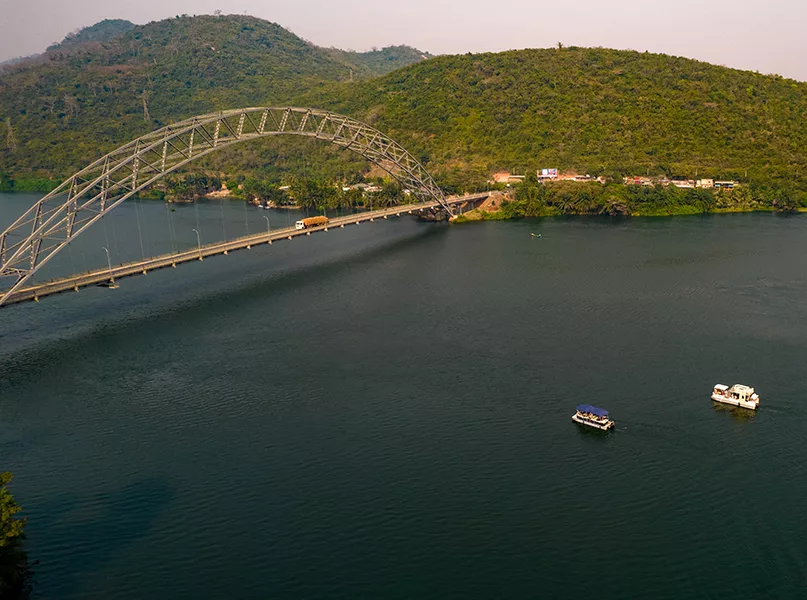
Cape Coast Castle
Cape Coast Castle is a UNESCO World Heritage Site and a powerful reminder of Ghana’s history. This imposing structure, built by European traders in the 17th century, was a central hub in the transatlantic slave trade. Today, it serves as a museum, offering visitors a poignant glimpse into the past through its preserved dungeons and historical exhibits.
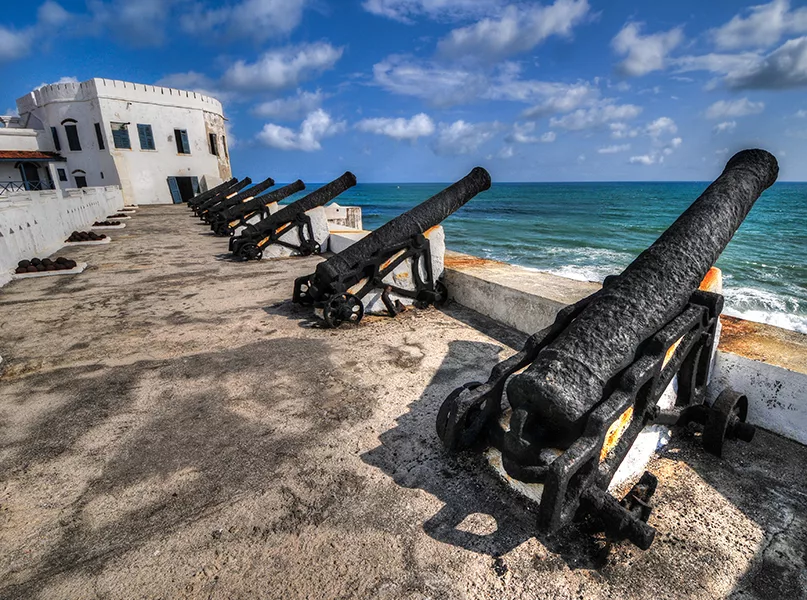
GETTING THERE AND AROUND
Reaching Ghana from international destinations is most convenient by air, with Kotoka International Airport in Accra serving as the primary gateway. The airport is well-connected to major cities across Europe, North America, the Middle East, and other parts of Africa through numerous international carriers.
Direct flights from hubs such as London, New York, and Dubai make travel to Ghana accessible and efficient. Regional flights within West Africa also connect Accra with neighbouring countries, facilitating easy travel within the region.
Road routes are also an option, with well-maintained highways linking Ghana to neighbouring countries such as Togo, Burkina Faso, and Côte d’Ivoire. Border crossings are generally straightforward, and bus services provide regular connections.
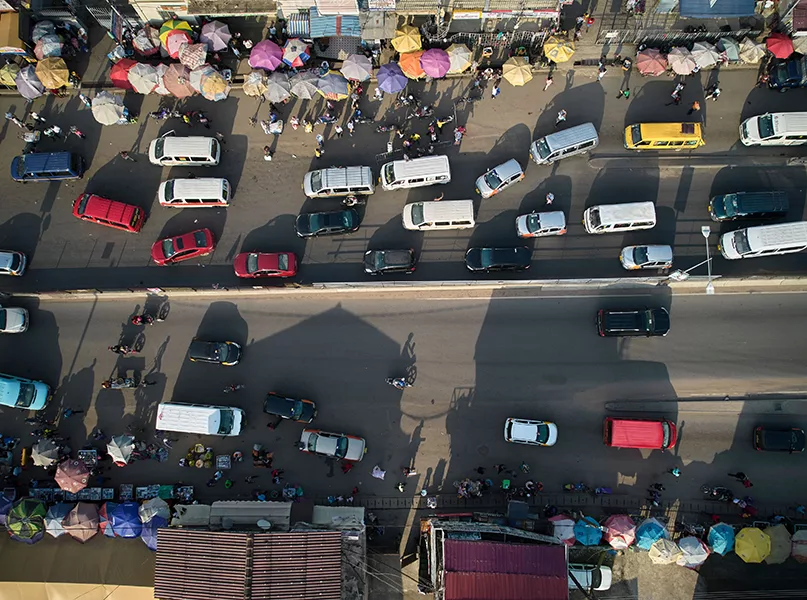
Once travellers have arrived in Ghana, various transportation options are available. Public transport includes a network of buses, minibuses (known locally as ‘trotros’), and taxis that operate between towns and cities.
While trotros offer an authentic experience, they can be crowded and less reliable. For more comfort and flexibility, private transport is recommended. Car rental services are available in major cities, and the road network is generally in good condition, making self-driving a viable option for exploring the country.
For those preferring guided experiences, numerous tour operators offer packages that include transport, allowing travellers to explore Ghana’s diverse attractions with ease.
The country’s compact size and developed infrastructure make it straightforward to navigate, ensuring a smooth and enjoyable travel experience.



